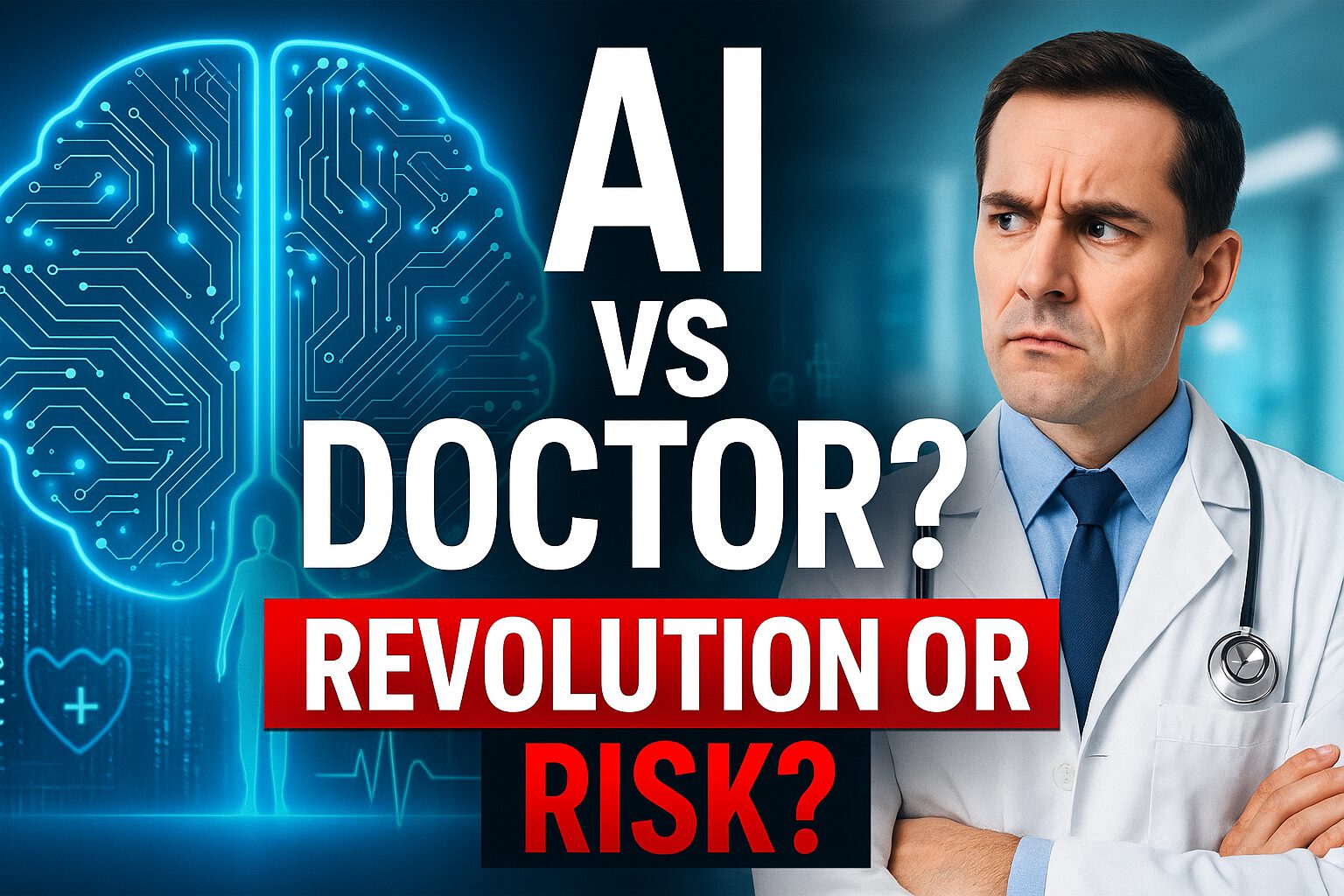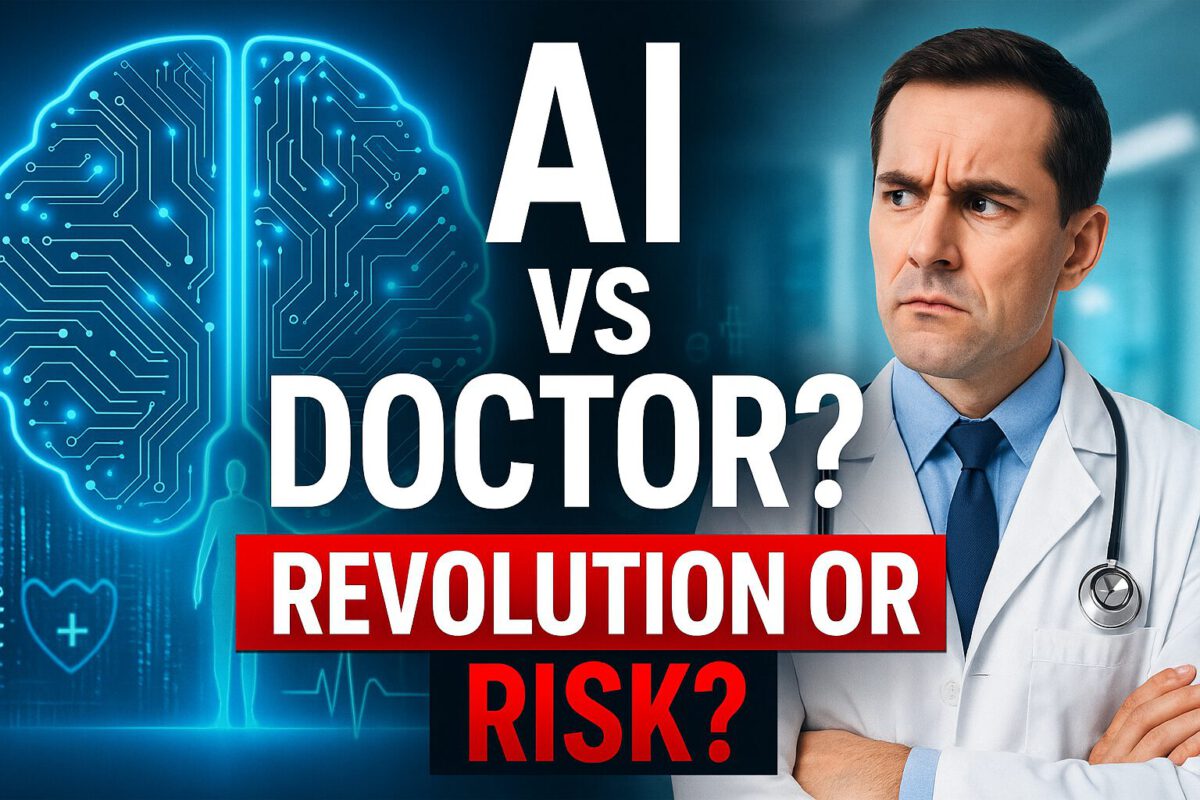How AI Is Transforming Healthcare: The Future Is Now
Introduction
Artificial Intelligence (AI) is revolutionizing every industry it touches and healthcare is no exception. From diagnosing diseases to personalizing treatment plans and accelerating drug discovery, AI has the potential to improve lives on a massive scale. But how exactly is AI being used in healthcare today, and what does the future hold? This article explores the key applications, benefits, challenges, and ethical considerations of AI in medicine, backed by the latest scientific research.
1. Early Diagnosis and Detection
Early diagnosis saves lives and AI is making it faster, cheaper, and more accurate. Machine learning algorithms trained on massive datasets can detect diseases from medical images like MRIs, CT scans, and X-rays with remarkable precision.
- A 2020 study published in Nature showed that Google’s AI system outperformed radiologists in breast cancer screening.
- AI systems have also been developed for identifying early signs of lung cancer, diabetic retinopathy, pneumonia, and even COVID-19.
- Deep learning models are being integrated into routine screenings, significantly improving diagnostic accuracy, especially in underserved areas.
AI is also expanding into areas like pathology, using slide imaging and pattern recognition to detect cancer cells and other abnormalities faster than manual review.
2. Personalized Medicine and Genomics
AI is powering the next wave of precision medicine tailoring medical treatment to the individual characteristics of each patient. With the ability to analyze genomic data alongside clinical history, AI can:
- Predict a patient’s response to specific medications
- Identify genetic markers for diseases
- Recommend targeted therapies for cancers based on mutation profiles
For example, in oncology, AI models predict how a tumor will respond to a particular chemotherapy based on its genetic makeup. AI-driven platforms like IBM Watson for Oncology have shown potential to suggest optimal cancer treatment plans in minutes, helping oncologists save time and improve care.
3. Accelerating Drug Discovery and Development
Bringing a new drug to market traditionally takes over a decade and billions of dollars. AI significantly reduces this timeline by:
- Predicting how different molecules interact with biological targets
- Reusing existing drugs for new conditions (drug repurposing)
- Modeling clinical trials to improve design and reduce risk
One of the most notable breakthroughs came from DeepMind’s AlphaFold, which accurately predicted the 3D structure of proteins a challenge that stumped scientists for decades. Understanding protein folding opens doors to new treatments for diseases like Alzheimer’s, Parkinson’s, and rare genetic conditions.
During the COVID-19 pandemic, AI was used to identify possible antiviral drugs in record time, proving its value in responding to global health emergencies.
4. Clinical Workflow Optimization
Behind every diagnosis is a mountain of paperwork. AI helps lighten the administrative load on healthcare providers through:
- Natural Language Processing (NLP) tools that transcribe and organize patient notes
- Automated coding systems for billing
- Scheduling and resource management in hospitals
By improving workflows and reducing manual data entry, AI allows clinicians to focus more on patient care and less on bureaucracy. In turn, this may reduce burnout a growing crisis among healthcare professionals.
5. Remote Monitoring, Virtual Care, and Preventive Health
AI is extending healthcare beyond clinic walls through wearable devices and remote patient monitoring. These systems track real-time data such as:
- Heart rate and arrhythmias
- Glucose levels in diabetics
- Oxygen saturation in respiratory diseases
- Sleep patterns and physical activity
Using this data, AI algorithms can predict potential health events before they occur, prompting preventive care. Additionally, AI chatbots and virtual assistants are improving access to healthcare information and basic triage, especially in areas with physician shortages.
6. Mental Health Applications
AI is also making strides in mental health through:
- Chatbots like Woebot and Wysa, which offer cognitive behavioral therapy (CBT)
- Sentiment analysis tools that detect signs of depression or anxiety in speech and text
- Predictive tools for suicide prevention based on social media data and health records
While these tools are still in development and cannot replace human therapists, they represent promising supplements for support between clinical sessions.
7. Ethical, Privacy, and Bias Considerations
As promising as AI is, it also raises complex ethical and societal questions:
- Data privacy: Patient data must be protected under laws like HIPAA and GDPR. Secure storage and consent are crucial.
- Algorithmic bias: AI systems trained on non-representative data can perpetuate health disparities. Diverse, inclusive datasets are essential.
- Accountability: When AI makes a mistake, who is responsible—the developer, the provider, or the institution?
- Transparency: Many AI models are “black boxes.” For high-stakes decisions, interpretability and explainability are critical.
Addressing these challenges requires interdisciplinary collaboration between healthcare providers, engineers, ethicists, and regulators.
8. The Future of AI in Healthcare
AI is not replacing doctors it’s empowering them. Future developments may include:
- AI-driven robotic surgery with enhanced precision
- Real-time diagnostics integrated with augmented reality
- Predictive models for public health planning and epidemic forecasting
- Integration of AI with electronic health records for a unified, intelligent patient profile
As these technologies mature, it is vital that implementation prioritizes patient safety, equity, and evidence-based practice.
Conclusion
AI is rapidly becoming one of the most transformative forces in modern medicine. By improving diagnosis, enhancing treatment, and streamlining operations, it holds the potential to make healthcare more effective, personalized, and accessible. Yet, with this power comes responsibility. As we move forward, we must ensure that these technologies serve the interests of all patients, uphold ethical standards, and continue to be guided by rigorous scientific inquiry.
Scientific References
- McKinney, S. M., et al. (2020). International evaluation of an AI system for breast cancer screening. Nature, 577(7788), 89-94.
- Jumper, J., et al. (2021). Highly accurate protein structure prediction with AlphaFold. Nature, 596(7873), 583–599.
- Esteva, A., et al. (2017). Dermatologist-level classification of skin cancer with deep neural networks. Nature, 542(7639), 115-118.
- Topol, E. (2019). Deep Medicine: How Artificial Intelligence Can Make Healthcare Human Again. Basic Books.
- Obermeyer, Z., & Emanuel, E. J. (2016). Predicting the future big data, machine learning, and clinical medicine. The New England Journal of Medicine, 375(13), 1216-1219.
- Rajkomar, A., et al. (2018). Scalable and accurate deep learning with electronic health records. npj Digital Medicine, 1(1), 1-10.
- Beam, A. L., & Kohane, I. S. (2018). Big data and machine learning in health care. JAMA, 319(13), 1317–1318.
- Topol, E. (2022). The future of medicine is in your smartphone. Cell, 185(3), 409-412.””


